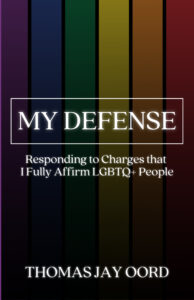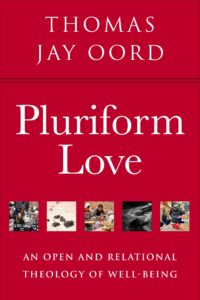What Does it Mean to Love Queer People?
I face a church trial near the end of July. I’m charged with teaching against the Church of the Nazarene’s statement on Human Sexuality. I’m queer affirming; the denomination is not.
I’m also charged with conduct unbecoming of a minister for arguing the denomination should be fully inclusive. I fully affirm queer people; I want the denomination to do the same.
Because I want to raise awareness of this issue, I’ve published my trial defense as a book: My Defense. It’s available for 99 cents as an ebook and $4.99 for print.
Below is an excerpt from My Defense. It’s the heart of my argument for why love compels to be fully affirming of queer people.
Love is Primary
Living a life of love is my primary purpose. It’s the center of what it means to follow Jesus and be in Christian community. With Jesus and the writers of scripture, I think love matters most. With John Wesley, I believe love is the heart of holiness. Those who embrace queer people often claim, like I do, that love motivates them to be fully LGBTQ+ affirming.
When I talk to those who do not fully affirm queer people, I rarely hear them appeal to love. Most non-affirming people employ a particular way of interpreting biblical passages they think apply to contemporary queer issues. This interpretation justifies, in their minds, opposition to queer behaviors, identities, and issues. A few will also appeal to the historical church when opposing LGBTQ+ people and issues.
Love the Sinner, Hate the Sin?
Some who embrace the current Manual statement on human sexuality claim to love queer people. They say they “love the sinner, but hate the sin,” which means they think same-sex behavior or nonheteronormative identity is sinful. Their opposition to queer people is, as they put it, “for their own good.”
I appreciate the claim that love seeks what’s good. After all, to love is to act intentionally, in relational response to God and others, to promote overall well-being. I’ve written about this often, including in my book Pluriform Love. Love aims for flourishing.
But the claim to want what is good for queer people while simultaneously opposing their healthy sexual behaviors, orientation, and identities makes no sense. It is not loving.
The Bible does not support well the non-affirming view. Biblical scholars have addressed these issues in books and articles. (See bibliography in My Defense.) But I want to mention other problems with claiming to love queer people while opposing them and their allies.
Love Listens
First, people who love well listen. Loving queer people means taking their queer testimonies into account when discerning what love asks of us. True listening means affording dignity to those who speak and being open to changing one’s mind.
The vast majority of LGBTQ+ people insist that to love them well means to affirm their identities, orientations, and healthy sexual behavior. Those who claim to love queer people while ignoring what queer people say are not loving well.
They’re not listening.
Love Seeks Flourishing
Second, love seeks well-being. It seeks what Jesus called “abundant life” and biblical writers call “blessedness,” “shalom,” or “eternal life.” The overwhelming scientific consensus is that queer people can experience well-being while embracing their queer identities and orientations.
According to Appendix paragraph 923 in the Manual, Nazarenes are supposed to be “open to scientific explanations….” According to the scientific consensus, same-sex sexual behavior can be healthy. Committed same-sex relationships can promote blessedness, wholeness, and flourishing.
Love as Friendship
Third, I find that most non-affirming people do not have close relationships with queer people. They don’t know well those whose “lifestyle” they don’t affirm.
John Wesley was right to argue that it’s difficult to love well those about whom we know little. Many are also misinformed, and some are fed misinformation by religious leaders.
While non-affirming folk think they love, queer people don’t experience them as loving.
Healthy Sexuality
The identities, orientations, and sexual behavior of LGBTQ+ people can be healthy.
I say “can be” not “is always” healthy, because I’m not saying queer people are morally perfect. But heteronormative people are also not perfect. At stake, of course, is what it means for sex and sexuality to be “healthy.”
In broad terms, “healthy” pertains to activities that promote well-being in various ways. Healthy sexual identities, orientations, and behaviors promote what’s good, beneficial, or flourishing. Healthy sexuality enhances us psychologically, socially, and physically. Same-sex sexual behavior that’s healthy can include the romance, pleasure, and intimacy sometimes found in healthy opposite-sex sexual behavior.[1] I advocate for sexual healthiness within the context of a committed relationship or (when possible) marriage.
Sanctified Queer People
I know LGBTQ+ people who experience the sanctification described in Article 10 of the Manual. They are sanctified. (Click the Loving Nazarenes graphic for testimonials.)
They have been transformed “into the likeness of Christ,” are “made free from original sin, or depravity,” have been “brought into a state of entire devotement to God,” express “the holy obedience of love made perfect,” enjoy the “infilling of the Holy Spirit,” experience “cleansing from sin,” are “empowered for life and service,” “grow in grace as a Christlike disciple,” improve “in Christlikeness of character and personality,” are “participating in the means of grace, especially the fellowship, disciplines, and sacraments of the Church,” and grow in “grace and in wholehearted love to God and neighbor.”
Unhealthy sexuality is manipulative, non-consensual, and harmful to bodies and relationships. Rape, bestiality, and pedophilia are unhealthy. Such sexuality hurts, isolates, leads to pain, and strains relationships. But “queer” is not the same as “unhealthy.” Both straight and queer people can engage in healthy or unhealthy sexual behavior.
Healthy queer sexual relationships promote a high quality of life.
Harming Queer People
The condemnation of LGBTQ+ people causes them great harm. Conversion therapy, for instance, rarely if ever helps, and it most often hurts. Queer people face excessive violence. Sometimes this treatment leads homophobes to kill queer people; other times, it leads queer people to take their own lives. Queer people are far less likely to attempt suicide if the communities in which they live accept them.[2]
LGBTQ+ people are also more susceptible to mental health problems because of the social, emotional, and religious condemnation they face. One study shows that when families reject their LGBTQ children, those children are 8.4 times more likely to attempt suicide, 5.9 times more likely to have high levels of depression, and 3.4 times more likely to use illegal drugs than LGBTQ children with supportive families.[3]
The Church Hurts Queer People
The Church of the Nazarene’s statement on human sexuality does not help queer people. It can easily justify their mistreatment. When the church does not embrace queer identities, orientation, and healthy sexual behavior, abusers believe violence against queer people is warranted. The Manual statement on human sexuality supports homophobia.
Rather than help, the statement on human sexuality hurts LGBTQ+ people.
Jesus Loves Queer People
I believe Jesus loves queer people and celebrates their healthy sexual expressions. I also believe Jesus would seek changes to the denomination’s Covenant of Christian Conduct. He would speak out, boldly calling for repentance, standing for the marginalized. Jesus would do so even if it made his critics angry and brought discomfort to his district superintendent.
This means that, in our context, Jesus would likely be given a Bill of Charges and brought to trial in the Church of the Nazarene. Like me, Jesus would be considered “divisive” and charged with “promoting an agenda contrary” to the denomination. Accusers would say he “taught and promoted ideas, beliefs, and doctrine out of harmony with” the denomination’s view of human sexuality.
Ironically, Jesus would not be brought to trial by a group that bears his name.
My Defense
The preceding is just a small part of My Defense. For the full argument and my response to the alleged evidence against me, get a copy of the book. For other essays on why the denomination should change, see Why the Church of the Nazarene Should be Fully LGBTQ+ Affirming.
[1]. In some respects, same-sex partnerships are healthier, on average, than traditional ones. See the John Gottman study on same-sex relationships: https://www.gottman.com/about/research/same-sex-couples/#:~:text=Results%20from%20the%20Gottman%20Gay,in%20how%20they%20receive%20it
[2]. “The Trevor Project: 2022 National Survey on LGBTQ Youth Mental Health,” https://www.thetrevorproject.org/survey-2022/
[3]. See “Parents’ rejection of a child’s sexual orientation fuels mental health problems,” March 2009, Vol 40, No. 3 Online: https://www.apa.org/monitor/2009/03/orientation





Comments
Dr. Oord, I am one of your students from some time ago. While I disagree with many of your views, I am stunned to learn of the efforts by people in power to set up this kangaroo court to shut down discourse. This attempt to disguise abuse of power as “due process” is truly pathetic. You know, as well as any perceptive person would know, that this is the unfortunate type of thing corrupt people tend to do the moment they realize they have lost an argument. Please continue to press on courageously as you have always done. You will continue to be respected by me and thousands of your students regardless of the outcome of this cowardly prosecution, which is honestly quite insignificant in the grand scheme of things.
Thanks for you kind note, Andy! I’ve wondered what you are doing these days. Still making photos? REading philosophy?
Thanks for those beautiful words of support, Andy!